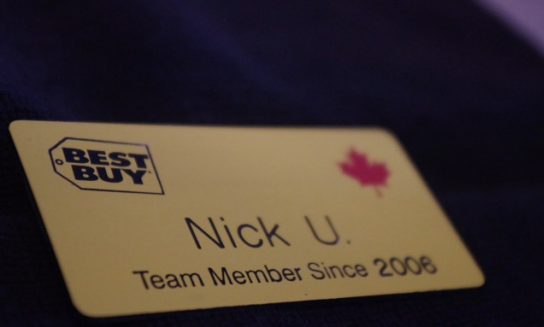Print Edition: February 6, 2013
In grade 12, I got my first real job. As in biweekly paycheque, punch clock, name tag.
It was October 2006 and I had been hired as a part-time media specialist at Best Buy after a couple of pretty run-of-the-mill in-person interviews and what amounted to an utterly transparent online lie detector test:
You see your supervisor carrying an open box item under his or her arm as they exit the building.
What do you do?
A) Immediately confront your supervisor.
B) Inform the store manager.
C) Inform the loss prevention specialist.
D) Do nothing.
How often do you lie?
A) Often.
B) Sometimes.
C) Never.
And so on. For over an hour.
Once hired, my task was to both stock shelves and help customers in the catch-all category of media products: video games, DVDs, CDs, stereos, telephones and even musical instruments. Anything not large enough to warrant its own department fell under our care.
I got a crisp, blue short-sleeved polo and a bright yellow pin. My name (“Nick U”) was tellingly applied hastily using a label-maker. I did manage to stick it out for long enough to get an etched pin, carving out a respectable career by big box retail standards. But in the nearly two years that I worked there, 80 per cent of the store’s employees came and went.
It was pretty steady work. I met some interesting people with shared pop culture interests, some of whom I still keep up with, and the staff discount helped make my CD and DVD addiction a little less rough on my bank account.
But then there were the blinding fluorescents and the ever-present dust cloud that left me feeling like I’d just gotten off an eight-hour flight after every shift. There was the weird, ritualistic company propaganda we’d have to grudgingly chant every morning in a circle before the doors opened to the deal-seeking public, champing at the bit. And there were the customers who expected me to know not only what we had in stock in every department, but to be able to provide them with a breakdown of its inner workings despite the fact that my training consisted mostly of motto memorization.
Perhaps the most unsettling thing of all was the fundamental corporate philosophy; to get promoted or even to stay on for long, you had to be a true believer. You couldn’t criticize or question, just chant “Best Buy! Best Buy! Best Buy!” while pushing unnecessary add-ons and product insurance on unwitting customers and spout off about the company’s so-called values.
Best Buy didn’t just want my time and hard work and friendly service. It wanted my soul.
Much like the Republican Party, Best Buy has quickly become too insular and self-congratulatory to allow for constructive criticism or any sort of innovation from within its ranks. For employees, the only hope for success was to become a sycophant.
As for me, I just tried to keep my mouth shut and get out as soon as I could. Those of us who weren’t willing to take that leap of faith found ourselves less motivated than we would have been had our bosses acknowledged and accepted the fact that this, for us, was just a job.
I didn’t believe in Best Buy. And I resented its unceasing attempts at conversion.
So it’s not without some small sense of devilish joy that I heard the news that Best Buy had closed seven of its locations across the country. I feel for the 800 workers who were laid off so suddenly. That’s a really shitty thing to happen, but it doesn’t exactly surprise me. I hope those people affected will find something more fulfilling beyond the unfeeling corporate retail giant that is Best Buy.
The big blue giant isn’t any good for its employees. Retail is a mixed bag to begin with, but working at Best Buy was particularly soul-killing. The same I imagine also goes for other big-box stores like Wal-Mart, Target, or Future Shop (also owned by Best Buy Canada, Ltd.). They create jobs, yes, but most of those jobs are part-time, no benefits. Barely enough for someone to pay the bills, if that. I use the designation part-time here somewhat loosely; for some of us, part time meant working 30-plus hours for three weeks in a row only to be cut down to 10 or 12 the fourth week. Why? So Best Buy didn’t have to start chipping in for benefits.
Stepping back from the employee side of the equation, I have to ask: what does Best Buy really have to offer its customers? Ill-informed sales staff. Complicated and antagonistic return policies. A brutal, fluorescent, characterless shopping environment plastered with endless sale signs. A cacophony of different kinds of music, advertisements and other noise blasting from sound systems across the store.
For records or video games or small ticket items, it’s much better to go to a speciality shop. Finding one that still exists in Best Buy’s wake will be a challenge. As soon as the retail giant debuted north of the 49th, it was only a matter of time before A&B Sound bit the dust. And others followed suit not long after. For big ticket items, like TVs or consoles or computers, it’s easier to do the research yourself and get a better deal online.
To see the place where I got my start in the working world, a stop gap of sorts turned obsolete relic of a bygone era, finally get its comeuppance is a mildly satisfying, albeit delayed victory for my 17-year-old self.



